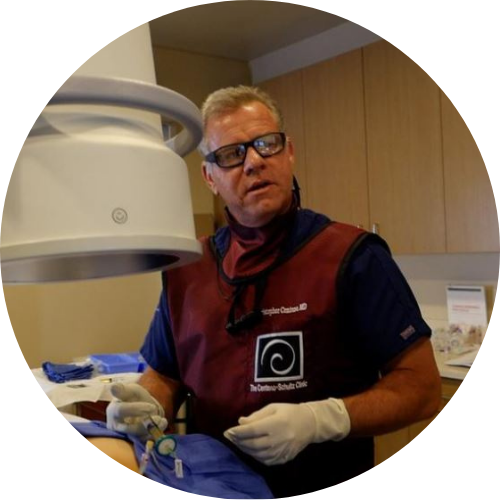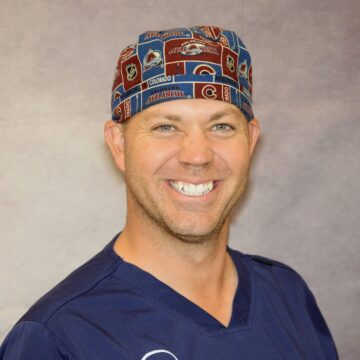Steroid Injection for Carpal Tunnel Syndrome
Do You Really Need a Steroid Injection for Your Carpal Tunnel Syndrome?
Am I a Candidate?Carpal tunnel syndrome is a widespread condition in society today thanks to the keyboard- and the device-driven world we live in. However, over time, as conservative measures and ergonomic adjustments fail to provide relief, many patients with carpal tunnel syndrome turn to steroid injections, a very common treatment for a very common condition. But are steroids a good idea, and do they really work?
What Is Carpal Tunnel Syndrome?
Carpal tunnel syndrome involves compression of the median nerve where it runs through a narrow passage on the palm-side of the wrist. The median nerve actually starts all the way up in the cervical spine (the neck area of the spine), branches down through the length of the arm and terminates in branches at the thumb and most of the fingers. So when carpal tunnel occurs, every structure the median nerve supplies below the compressed nerve can suffer, which is most of the hand and fingers.
What might compress the median nerve? It could be a physical external force, which is why those repetitive keyboard motions that keep this area of the wrist firmly planted on a hard surface for long periods of time can, over time, compress this vulnerable nerve. One study even suggested a link between carpal tunnel syndrome and Smartphone overuse. In addition, there could also be a nerve condition within the body itself that could cause this to occur. Symptoms of carpal tunnel syndrome could be anything from pain, swelling, and numbness to tingling or even a pins-and-needles feeling in the wrist, thumb, or the first three fingers (the pinkie and part of the ring finger is supplied by a different nerve—the ulna nerve).
Many patients with carpal tunnel syndrome will turn to steroids, many times as an attempt to delay what they believe is the inevitable surgery. One study, however, shows that steroids may be sabotaging your surgical results. Let’s take a look.
Carpal Tunnel Steroid Injections Mean Poor Surgical Outcomes
One study compared the five- to six-year outcomes following carpal tunnel surgery in patients who’d had steroid injections to those who hadn’t. They found poorer long-term outcomes (e.g., continuing pain and tingling, waking at night in discomfort, etc.) in those who’d had steroid injections before they had surgery than in those who didn’t have steroid injections before surgery. And, interestingly, the more injections received the higher these risks. In addition, only slightly over half (53%) of patients who received steroid injections reported full resolution of their symptoms five and six years after their surgery.
So does this mean you should just skip the steroids from the start and go straight for the carpal tunnel surgery? No way! As we’ve covered before, surgery is also bad news for carpal tunnel syndrome as it is an invasive procedure that involves cutting a crucial ligament, which disrupts the biomechanics in the wrist.
More Problems Linked to Steroid Injections
Steroid injections, regardless of what condition they are treating, are associated with so many problems. You might be relieving your inflammation and pain (though not always as you’ll read below), but you may be setting yourself up for many more problems in the future. Let’s take a look at a few problems with steroids:
- Steroids wipe out mesenchymal stem cells.
- Steroids damage tendon cells and worsen tendinitis symptoms.
- Steroids kill cartilage!
- Steroids disrupt your hormones that manage stress (i.e., the cortisol pituitary axis)
So if surgery is bad and steroids are bad, what’s the alternative?…
Treating Carpal Tunnel Syndrome Nonsurgically with Your Own Platelet Lysate
Your own platelets can be isolated and their growth factors concentrated. This platelet lysate can then be injected under precise imaging guidance around the compressed median nerve. Take a look at the video below as Dr. Centeno performs this hydrodissection procedure for carpal tunnel syndrome:
Steroid injections are not the answer for carpal tunnel syndrome. If the intention is to delay surgery, it appears that all of those steroid injections will just decrease your risk for a successful surgery. So if you must go the surgical route, you certainly don’t want to sabotage your outcomes. That being said, surgery, too, is a bad idea for carpal tunnel syndrome as well as it disrupts the biomechanics in the wrist that can only create more problems in the future. Your interventional orthopedic physician, on the other hand, can treat your carpal tunnel nonsurgically and without harmful steroids by utilizing your own platelets.
Doctors Who Provide an Alternative to Steroid Injections for CTS

Christopher J. Centeno, MD
Christopher J. Centeno, M.D. is an international expert and specialist in Interventional Orthopedics and the clinical use of bone marrow concentrate in orthopedics.
Dr. Centeno is one of the few physicians in the world with extensive experience in the culture expansion of and clinical use of adult bone marrow concentrate to treat orthopedic injuries. His clinic incorporates a variety of revolutionary pain management techniques to bring its broad patient base relief and results. Dr. Centeno treats patients from all over the US who travel to Colorado to undergo innovative, non-surgical treatments. Dr. Centeno has chaired multiple international research-based conferences. He also maintains an active research-based practice, with multiple publications listed in the US National Library of Medicine. Dr. Centeno has also served as editor-in-chief of a medical research journal dedicated to traumatic injury.
Dr. Centeno trained at the Baylor College of Medicine, Texas Medical Center, and the Institute for Rehabilitation Research. He hails from both Florida and New York and currently resides in Boulder, Colorado with his wife and three children.

John Schultz, MD
John R. Schultz M.D. is a national expert and specialist in Interventional Orthopedics and the clinical use of bone marrow concentrate for orthopedic injuries. He is board certified in Anesthesiology and Pain Medicine and underwent fellowship training in both. Dr. Schultz has extensive experience with same day as well as culture expanded bone marrow concentrate and sees patients at the CSC Broomfield, Colorado Clinic, as well the Regenexx Clinic in Grand Cayman. Dr. Schultz emphasis is on the evaluation and treatment of thoracic and cervical disc, facet, nerve, and ligament injuries including the non-surgical treatment of Craniocervical instability (CCI). Dr. Schultz trained at George Washington School of…
Read more
John Pitts, M.D.
Dr. Pitts is originally from Chicago, IL but is a medical graduate of Vanderbilt School of Medicine in Nashville, TN. After Vanderbilt, he completed a residency in Physical Medicine and Rehabilitation (PM&R) at Emory University in Atlanta, GA. The focus of PM&R is the restoration of function and quality of life. In residency, he gained much experience in musculoskeletal medicine, rehabilitation, spine, and sports medicine along with some regenerative medicine. He also gained significant experience in fluoroscopically guided spinal procedures and peripheral injections. However, Dr. Pitts wanted to broaden his skills and treatment options beyond the current typical standards of care.
Read more
Jason Markle, D.O.
Post-residency, Dr. Markle was selected to the Interventional Orthopedic Fellowship program at the Centeno-Schultz Clinic. During his fellowship, he gained significant experience in the new field of Interventional Orthopedics and regenerative medicine, honing his skills in advanced injection techniques into the spine and joints treating patients with autologous, bone marrow concentrate and platelet solutions. Dr. Markle then accepted a full-time attending physician position at the Centeno-Schultz Clinic, where he both treats patients and trains Interventional Orthopedics fellows. Dr. Markle is an active member of the Interventional Orthopedic Foundation and serves as a course instructor, where he trains physicians from around the world.
Read more
Brandon T. Money, D.O., M.S.
Dr. Money is an Indiana native who now proudly calls Colorado home. He attended medical school at Kansas City University and then returned to Indiana to complete a Physical Medicine and Rehabilitation residency program at Indiana University, where he was trained on non-surgical methods to improve health and function as well as rehabilitative care following trauma, stroke, spinal cord injury, brain injury, etc. Dr. Money has been following the ideology behind Centeno-Schultz Clinic and Regenexx since he was in medical school, as he believed there had to be a better way to care for patients than the status quo. The human body has incredible healing capabilities…
Read moreAm I a Candidate?
To answer this question, fill out the candidate form below to request a new patient evaluation, and a patient advocate will reach out to you to determine your next steps. Your one-hour, in-office or telemedicine evaluation will be with one of the world’s experts in the field of Interventional Orthopedics.